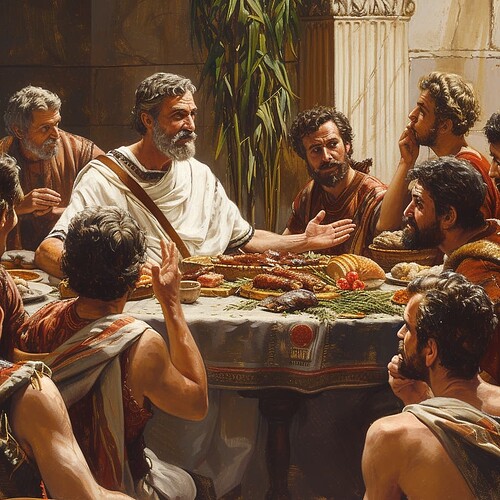![]() February 25: 1 Corinthians 8, 9 - Understanding Freedom, Responsibility, and Love
February 25: 1 Corinthians 8, 9 - Understanding Freedom, Responsibility, and Love
![]() Introduction
Introduction
In this insightful journey through 1 Corinthians 8 and 9, Paul focuses on the meaning of knowledge, freedom, and responsibility in the context of spiritual living.
![]() Knowledge, Love, and Eating Food Offered to Idols
Knowledge, Love, and Eating Food Offered to Idols
Paul discusses the debate about eating food offered to idols. He points out knowledge is good, but love is superior. For it is love that builds up while knowledge puffs up.
![]() Key Verse: “Knowledge puffs up, but love builds up.” - 1 Corinthians 8:1b
Key Verse: “Knowledge puffs up, but love builds up.” - 1 Corinthians 8:1b
![]() Paul’s Freedom, Rights, and Ministry
Paul’s Freedom, Rights, and Ministry
In 1 Corinthians 9, Paul defends his apostleship, emphasizing his rights and his choice to sacrifice them for the growth of the Church.
![]() Key Verse: “Though I am free and belong to no one, I have made myself a slave to everyone, to win as many as possible.” - 1 Corinthians 9:19
Key Verse: “Though I am free and belong to no one, I have made myself a slave to everyone, to win as many as possible.” - 1 Corinthians 9:19
![]() Key Themes and Reflections
Key Themes and Reflections
- The supremacy of love over knowledge
- The responsibility that comes with freedom
- The need for self-discipline in the Christian walk
![]() Today’s Application
Today’s Application
In modern life, it’s easy to focus on gaining knowledge and exercising our own rights. But like Paul, let’s prioritize love and be willing to sacrifice our freedom for the good of others while maintaining self-discipline.
![]() Hidden Gem
Hidden Gem
The Greek word used for “win” in 1 Corinthians 9:19 is ‘kerdaino’, which can also mean ‘gain’ or ‘profit’. It captures the essence of Paul’s mission – not personal gain, but the valuable “profit” of bringing others to Christ.
![]() Reflective Q&A
Reflective Q&A
![]() Why does Paul mention his rights and yet surrender them?
Why does Paul mention his rights and yet surrender them?
A: Paul uses his rights to illustrate Christ’s model of sacrifice and service. He emphasizes the choice of laying down our rights for the cause of love and unity.
![]() How can we ‘win’ others for Christ in today’s world?
How can we ‘win’ others for Christ in today’s world?
A: As Paul did, we can identify with others, showcasing Christ’s love and humility. This often means sacrificing our comfort, prestige, or time to serve others and spread the Gospel.
![]() How does knowledge ‘puff up’, and how does love ‘build up’?
How does knowledge ‘puff up’, and how does love ‘build up’?
A: Knowledge without love can lead to pride, while love seeks the best for others, thus fostering growth and unity.
![]() Join the Discussion
Join the Discussion
How are you living out the principles of love, responsibility, and self-discipline in your life? Share your insights and learn from others in our AIgniteScripture community.
![]() See you tomorrow in 1 Corinthians 10:
See you tomorrow in 1 Corinthians 10:
Excited about tomorrow’s reading? It introduces the powerful idea of running the race to get the heavenly prize!
Keep reflecting on the themes of love that builds up, freedom exercised with responsibility, and the self-discipline needed in our walk with Christ.
